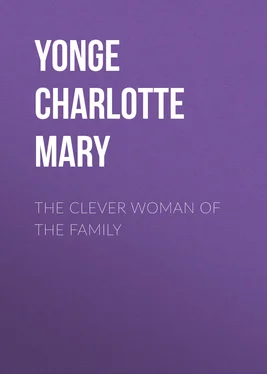Charlotte Yonge - The Clever Woman of the Family
Здесь есть возможность читать онлайн «Charlotte Yonge - The Clever Woman of the Family» — ознакомительный отрывок электронной книги совершенно бесплатно, а после прочтения отрывка купить полную версию. В некоторых случаях можно слушать аудио, скачать через торрент в формате fb2 и присутствует краткое содержание. Жанр: foreign_prose, literature_19, Европейская старинная литература, foreign_antique, на английском языке. Описание произведения, (предисловие) а так же отзывы посетителей доступны на портале библиотеки ЛибКат.
- Название:The Clever Woman of the Family
- Автор:
- Жанр:
- Год:неизвестен
- ISBN:нет данных
- Рейтинг книги:4 / 5. Голосов: 1
-
Избранное:Добавить в избранное
- Отзывы:
-
Ваша оценка:
- 80
- 1
- 2
- 3
- 4
- 5
The Clever Woman of the Family: краткое содержание, описание и аннотация
Предлагаем к чтению аннотацию, описание, краткое содержание или предисловие (зависит от того, что написал сам автор книги «The Clever Woman of the Family»). Если вы не нашли необходимую информацию о книге — напишите в комментариях, мы постараемся отыскать её.
The Clever Woman of the Family — читать онлайн ознакомительный отрывок
Ниже представлен текст книги, разбитый по страницам. Система сохранения места последней прочитанной страницы, позволяет с удобством читать онлайн бесплатно книгу «The Clever Woman of the Family», без необходимости каждый раз заново искать на чём Вы остановились. Поставьте закладку, и сможете в любой момент перейти на страницу, на которой закончили чтение.
Интервал:
Закладка:
For it was not a really poor population. The men were seafaring, the women lacemaking, and just well enough off to make dissent doubly attractive as an escape from some of the interfering almsgiving of the place. Over-visiting, criticism of dress, and inquisitorial examinations had made more than one Primitive Methodist, and no severe distress had been so recent as to render the women tolerant of troublesome weekly inspections. The Curtis sisters were, however, regarded as an exception; they were viewed as real gentlefolks, not only by their own tenants, but by all who were conscious of their hereditary claims to respect; they did not care whether hair were long or short, and their benefits were more substantial and reliable than could be looked for from the casual visitors and petty gentry around, so that sundry houses that were forbidden ground to district visitors, were ready to grant them a welcome.
One of these belonged to the most able lacemaker in the place, a hard-working woman, who kept seven little pupils in a sort of cupboard under the staircase, with a window into the back garden, “because,” said she, “they did no work if they looked out into the front, there were so many gapsies;” these gapsies consisting of the very scanty traffic of the further end of Mackarel Lane. For ten hours a day did these children work in a space just wide enough for them to sit, with the two least under the slope of the stairs, permitted no distraction from their bobbins, but invaded by their mistress on the faintest sound of tongues. Into this hotbed of sprigs was admitted a child who had been a special favourite at school, an orphan niece of the head of the establishment. The two brothers had been lost together at sea; and while the one widow became noted for her lace, the other, a stranger to the art, had maintained herself by small millinery, and had not sacrificed her little girl to the Moloch of lace, but had kept her at school to a later age than usual in the place. But the mother died, and the orphan was at once adopted by the aunt, with the resolve to act the truly kind part by her, and break her in to lacemaking. That determination was a great blow to the school visitors; the girls were in general so young, or so stupefied with their work, that an intelligent girl like Lovedy Kelland was no small treasure to them; there were designs of making her a pupil teacher in a few years, and offers and remonstrances rained in upon her aunt. But they had no effect; Mrs. Kelland was persuaded that the child had been spoilt by learning, and in truth poor Lovedy was a refractory scholar; she was too lively to bear the confinement patiently; her mind was too much awake not to rebel against the dulness, and her fingers had not been brought into training early enough. Her incessant tears spoilt her thread, and Mrs. Kelland decided that “she’d never get her bread till she was broke of her buke;” which breaking was attempted by a summary pawning of all poor Lovedy’s reward books. The poor child confided her loss to her young lady teacher at the Sunday school; the young lady, being new, young, and inflammable, reproached Mrs. Kelland with dishonesty and tyranny to the orphan, and in return was nearly frightened out of her wits by such a scolding as only such a woman as the lace mistress could deliver. Then Mr. Touchett tried his hand, and though he did not meet with quite so much violence, all he heard was that she had “given Lovedy the stick for being such a little tod as to complain, when she knew the money for the bukes was put safe away in her money-box. She was not going to the Sunday schule again, not she, to tell stories against her best friends!” And when the next district visitor came that way, the door was shut in her face, with the tract thrown out at the opening, and an intimation in Mrs. Kelland’s shrill voice, that no more bukes were wanted; she got plenty from Miss Curtis.
These bukes from Miss Curtis were sanatory tracts, which Rachel was constantly bestowing, and which on Sundays Mrs. Kelland spelt through, with her finger under the line, in happy ignorance whether the subject were temporal or spiritual, and feeling herself in the exemplary discharge of a Sunday duty. Moreover, old feudal feeling made Rachel be unmolested when she came down twice a week, opened the door of the blackhole under the stairs, and read aloud something religious, something improving, and a bit of a story, following it up by mental arithmetic and a lesson on objects, which seemed to Mrs. Kelland the most arrant nonsense in the world, and to her well-broken scholars was about as interesting as the humming of a blue-bottle fly; but it was poor Lovedy’s one enjoyment, though making such havoc of her work that it was always expiated by extra hours, not on her pillow, but at it.
These visits of Rachel were considered to encourage the Kelland refractoriness, and it was officially intimated that it would be wise to discontinue them, and that “it was thought better” to withdraw from Mrs. Kelland all that direct patronage of her trade, by which the ladies had enabled her to be in some degree independent of the middle-men, who absorbed so much of the profit from the workers. Grace and Rachel, sufficiently old inhabitants to remember the terrible wreck that had left her a struggling widow, felt this a hard, not to say a vindictive decision. They had long been a kind of agents for disposing of her wares at a distance; and, feeling that the woman had received provocation, Grace was not disposed to give her up, while Rachel loudly averred that neither Mr. Touchett nor any of his ladies had any right to interfere, and she should take no notice.
“But,” said Grace, “can we run counter to our clergyman’s direct wishes?”
“Yes, when he steps out of his province. My dear Grace, you grew up in the days of curatolatry, but it won’t do; men are fallible even when they preach in a surplice, and you may be thankful to me that you and Fanny are not both led along in a string in the train of Mr. Touchett’s devotees!”
“I wish I knew what was right to do,” said Grace, quietly, and she remained wishing it after Rachel had said a great deal more; but the upshot of it was, that one day when Grace and Fanny were walking together on the esplanade, they met Mr. Touchett, and Grace said to him, “We have been thinking it over, and we thought, perhaps, you would not wish us not to give any orders to Mrs. Kelland. I know she has behaved very ill; but I don’t see how she is to get on, and she has this child on her hands.”
“I know,” said Mr. Touchett, “but really it was flagrant.”
“Oh,” said Lady Temple, gently, “I dare say she didn’t mean it, and you could not be hard on a widow.”
“Well,” said Mr. Touchett, “Miss Brown was very much put out, and—and—it is a great pity about the child, but I never thought myself that such strong measures would do any good.”
“Then you will not object to her being employed?”
“No, not at all. From a distance, it is not the same thing as close at home; it won’t be an example.”
“Thank you,” said Grace; and “I am so glad,” said Lady Temple; and Mr. Touchett went on his way, lightened of his fear of having let his zealous coadjutors oppress the hard-working, and far more brightened by the sweet smile of requital, but all the time doubtful whether he had been weak. As to the victory, Rachel only laughed, and said, “If it made Grace more comfortable, it was well, except for that acknowledgment of Mr. Touchett’s jurisdiction.”
A few days after, Rachel made her appearance in Mackerel Lane, and announced her intention of consulting Ermine Williams under seal of secrecy. “I have an essay that I wish you to judge of before I send it to the ‘Traveller.’”
“Indeed!” said Ermine, her colour rising. “Would it not be better—”
Читать дальшеИнтервал:
Закладка:
Похожие книги на «The Clever Woman of the Family»
Представляем Вашему вниманию похожие книги на «The Clever Woman of the Family» списком для выбора. Мы отобрали схожую по названию и смыслу литературу в надежде предоставить читателям больше вариантов отыскать новые, интересные, ещё непрочитанные произведения.
Обсуждение, отзывы о книге «The Clever Woman of the Family» и просто собственные мнения читателей. Оставьте ваши комментарии, напишите, что Вы думаете о произведении, его смысле или главных героях. Укажите что конкретно понравилось, а что нет, и почему Вы так считаете.












